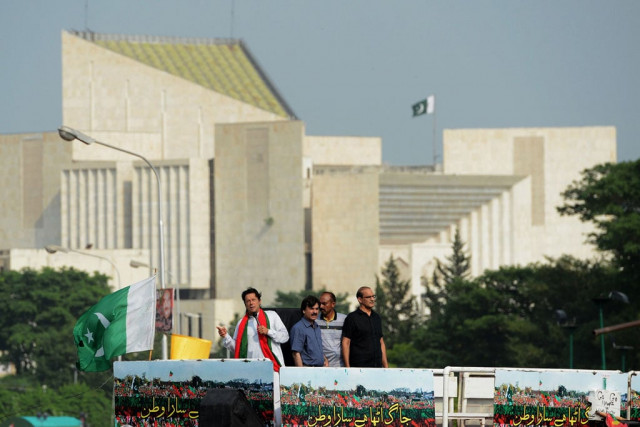SC orders PAT, PTI to vacate Constitution Avenue
Court directs both parties to clear the area within 24 hours .

The Supreme Court on Monday set a 24-hour deadline to Pakistan Awami Tehreek (PAT) and Pakistan Tehreek-e-Insaf (PTI) supporters to abandon their Constitution Avenue camps – whose presence has restricted public access to the court.
A five-member bench of the apex court, headed by Chief Justice Nasirul Mulk, was hearing the Supreme Court Bar Association (SCBA) president’s petition against the anti-government demonstrations that have virtually paralysed the capital.
In his petition, the SCBA president pointed out that the demonstrators are infringing upon the rights of the common citizen by restricting their movement in the area.
The court directed attorney general and lawyers representing both parties to work out a possible solution to ensure free movement of people in the area by Tuesday (today).
“The test will be when we (the judges) try to come to the Supreme Court tomorrow using Constitution Avenue,” Justice Mulk said.
Both parties are staging sit-ins on the Constitution Avenue in the heart of Islamabad’s heavily fortified red zone which includes parliament house and the Supreme Court building, blocking all kinds of traffic from the main avenue.

Supporters of Imran Khan’s PTI and Tahirul Qadri’s PAT, who have encamped in the area since August 19 have refused to leave until Prime Minister Nawaz Sharif steps down.
Referring to a picture showing clothes hanging out to dry outside the top court, the chief justice lamented that court’s boundary was being used by protesters to dry their clothes. The bench directed PAT’s counsel Ali Zafar to take notice and prevent such actions.
Similarly, Justice Anwar Zaheer Jamali said that the encampments have paralyzed key institutions including Election Commission of Pakistan and the Federal Shariat Court. He questioned if the protesters were peaceful, why were they wielding sticks and batons?
During the hearing, Attorney General Salman Aslam Butt told the bench that the government is willing to provide an alternate site to both parties for their sit-in. Subsequently, he proposed the Sports Complex as an alternate venue for protests in the capital.
The chief justice, however, said that court just wanted clearance of Constitution Avenue for the free movement of public while an alternate venue was not its concern.
He said protesters had set up hurdles not only for the judges but also the lawyers and litigants, while certain groups were also carrying out an identity check of individuals entering the court premises.
PTI chief’s counsel Hamid Khan contended that party supporters were camping in an open area in front of the parliament house and were not disrupting the flow of traffic on Constitution Avenue.
On the bench’s query, he explained that Imran was referring to God, when he mentioned the ‘third empire’ during a fiery speech to his supporters last week.
Similarly, PAT’s chief counsel also assured the bench that he conveyed the court’s concern regarding obstruction of free movement on Constitution Avenue to the party leadership.
Taking a swipe at the PAT chief, a Canadian national who has sworn an oath of loyalty to the Britain’s Queen Elizabeth, Justice Jawad Khawaja said that protests on the streets must be the norm in Canada. “One of the players of this game is a Canadian citizen”, the judge said.
Referring to statements made by Pashtoonkhwa Milli Awami Party (PkMAP) chief Mahmood Khan Achakzai, Justice Khawaja said that the repercussions of the ongoing protests are very serious.
Justice Mian Saqib Nisar, however, made it clear that the court was not concerned about political issues and demands made by both protesting parties in Islamabad. He said that the court would enforce its authority under Article 184 (3) of the Constitution, ensuring free movement in the capital.
Published in The Express Tribune, August 26th, 2014.






1724319076-0/Untitled-design-(5)1724319076-0-208x130.webp)












COMMENTS
Comments are moderated and generally will be posted if they are on-topic and not abusive.
For more information, please see our Comments FAQ